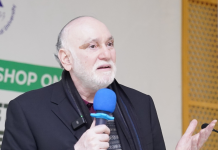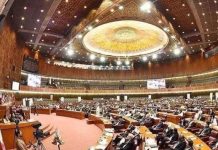Islamabad Dec 10 :The Ehsaas programme – Prime Minister Imran Khan’s flagship poverty alleviation initiative –is already delivering positive change for the people of Pakistan and has laid the foundations to become a global model for reducing poverty. This is a key message of a new and independent report published today by Delivery Associates, a globally respected firm that works with governments across the world to achieve measurable developmental impact. The Ehsaas report is penned by Sir Michael Barber who is the Chairman and Founder of Delivery Associates. He is one of the world’s leading education reformers, and from 2001 to 2005 was Chief Advisor on Delivery to Prime Minister Tony Blair.
In a press conference jointly hosted by Poverty Alleviation and Social Safety Division and Ministry of Information and Broadcasting (MOIB) Pakistan today, Sir Michael Barber connected virtually from UK to unveil the Ehsaas report together with SAPM Dr. Sania Nishtar and Federal Minister for MOIB, Shibli Faraz.
The report, entitled, ‘The Ehsaas Programme: Shift from politics of patronage to politics of performance’, analyses the first year of the Government’s flagship programme, Ehsaas. Outlining the initial steps taken to establish the programme to be transparent, multisectoral andresults-driven, it goes on to highlight some of the major achievements to date.
Among those commended are the Ehsaas Kafaalat, which provides unconditional cash transfers to millions of the poorest women, Ehsaas Undergraduate Scholarships, which awards over 50,000 scholarships a year to students fromdisadvantaged background and Ehsaas Nashonuma, a conditional cash transfers to increase uptake of health and nutrition. Also, an extensive process of governance reforms commenced in Poverty Alleviation and Social Safety Division and its implementing agencies to deliver Ehsaas. The Ehsaas Governance and Integrity Policy was approved by the Cabinet on Nov 12, 2019 to ensure those organizations involved in delivery of welfare are effective and responsive to the needs of those who they are mandated to serve. Also, Governance observatory and multi-stakeholder monitoring were introduced.
“Our analysis shows that Ehsaas, by focussing on accountability and impact, has laid the foundations for becoming a globally leading exemplar on how to tackle poverty”, said Sir Michael Barber, CEO of Delivery Associates. “I have had the honour of working with successive Pakistani governments throughout my career, and it is fantastic to see Ehsaas embedded at the heart of the current administration. The Ehsaas team, under the strong leadership and unwavering integrity of Prime Minister Imran Khan and Dr. Sania Nishtar have made huge progress in just one year. The reforms and structural changes pioneered by the team resulted in the rapid delivery of Ehsaas Emergency Cash to 12 million households against the challenging and unprecedented backdrop of COVID-19. Their work is going to be vital in the coming months and years.”
The report also praises the programme’s use of technology and data, which underpin monitoring routines designed to ensure robust governance discipline throughout its operations. This includes a new data dashboard, openly displayed on the Ehsaas website, which uses a traffic light system to track progress on different strands of the programme, highlighting progress and improving transparency.
“This is a comprehensive and timely report from Delivery Associates, which helps us to reflect on the achievements of the Ehsaas programme in its first year, while paving the way for continued success,” said Dr Sania Nishtar. “This analysis will help us to stay focussed on our goal of ending poverty in Pakistan and improved delivery for all of our beneficiaries, with the hope that Ehsaas can eventually be a model for the world”, she further added.
Delivery Associates is based in the UK and works with government leaders from over 40 countries. It works in partnership with governments, public bodies and other organisations to build measurable value for as many people as possible. There are teams on the ground in twenty different countries around the world, with twenty-four different nationalities represented and twenty different languages spoken.

















